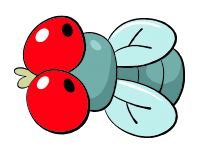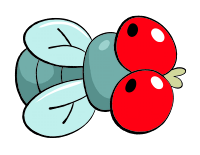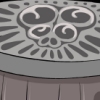
DAY FIVE: CELLAR SPIDERS

[REAL PHOTO HERE]
Photo by Joseph Berger
A popular urban myth goes that the so-called "Daddy Long Legs" is in fact the most venomous of all the world's spiders, but that its tiny jaws aren't capable of penetrating human skin. Depending on where you live, however, a "Daddy Long Legs" is either an arachnid called a harvestman, a long-legged crane fly, or one of today's spiders from the genus Pholcidae, or "cellar spiders."The part about the fangs is almost true. It's not terribly easy for these delicate little creatures to bite, and they're so unlikely to try that it's easy to assume they just can't hack it. The part about the venom, however, is obviously false. If you can get such an easy-going animal to actually give you a nip (what did you DO!?) and it pulls off the daunting feat of getting its fangs through the leathery hide of a mammalian kaiju, the most you're going to suffer is something like a mosquito bite.
This is pretty lucky for us, because these just so happen to be the most common spiders found within our own homes, and odds are pretty high you're living with a few of them even now - look for them in window frames, closets, basements or just about any upper corner in the house. You've gotta have at least one! Surely! And she virtually never leaves the tangled cobweb she calls home, preying on moths, mosquitoes, silverfish, roaches, and especially other spiders, sometimes clearing a household of almost all other web-building Araneae!
Like many "household" arthropods, cellar spiders originally evolved to thrive in caves, which certainly explains their ghostly pale, translucent appearance, and the fact that they fare very poorly outdoors, dying quickly if they're too exposed to the extreme humidity and temperature shifts of a back yard. If you must boot a Pholcid or two from your home but would rather not seal their doom, almost any hollow, artificial structure can make a suitable environment for such a small creature; a garage, a tool shed, a public bathroom...in cooler weather they could probably even survive in a large enough mailbox! You can drop them off just about anywhere constructed by humans but not regularly noticed and cleaned by humans!
Or, you know, just let them hang around. They evolved to share our "caves" with us!
































